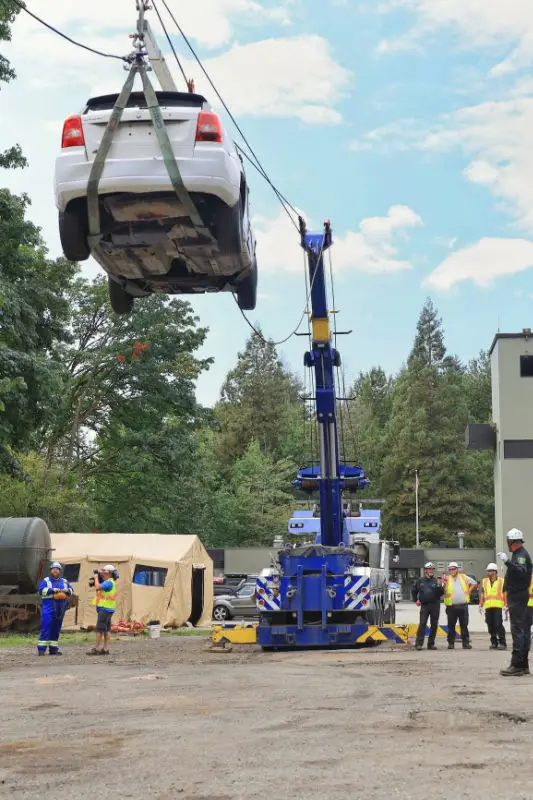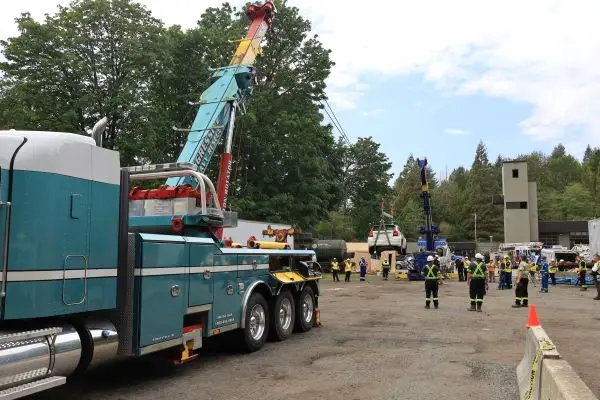For the first time ever, Canadian tow truck operators got an opportunity to advance their skills to the highest level available through a five-day WreckMaster training held in Canada. It was hosted by the Automotive Retailers Association (ARA) and sponsored by its towing and recovery division members, Mitchell’s Towing and Roadway Towing, at North Vancouver Fire Training Centre, from August 18 to 22.
A total of 23 towing and recovery professionals enrolled in this historical class, coming from as far as the east coast of Canada. During the training, they practiced the most advanced rigging and winching techniques in most complicated and unusual recovery situations.
“Most of the motoring public thinks that we are just going to pull, tear, and rip something apart, but there is a lot more to it,” said WreckMaster lead instructor, Bruce Campbell, of the stereotypical view of tow truck operators. “We have to understand about the workload limits of the rigging, wire rope, chains, the shackles, and what the trucks can handle.”

Even though tow truck operators are not classified as first responders, they play a key role in assisting in emergency situations and they do face the same hazards as the police, the fire department, or paramedics, on the side of the highway. As well, tow truck operators are trained to safely rescue the motoring public from the side of the road, without further damaging the vehicle, and their job also involves traffic control, risk management, or site restoration to the pre-accident condition, including spill and environmental cleanup.
Their job is not limited to the highways; they have to be ready to respond to any accident, whether it is recovering a vehicle on unmaintained logging road, pulling a fully-loaded semi truck out of a lake, or rescuing a tractor trailer stuck on an overpass embankment. The value of a professional training, like WreckMaster, is that it gives tow truck operators a strong foundation of knowledge that they can build on when dealing with various situations on the job. In more advanced classes, students then explore the most complex recovery techniques and enhance their critical thinking and leadership skills.
“This is the highest level [of training] that we offer at the moment, the level 8/9R,” said Bruce. The “R” stands for rotators, one of the largest and heaviest tow trucks that are used in incident management, when the recovery needs to be performed as soon as possible to clear the roadway.
As part of the training, students practiced one of the most advanced techniques ever. By using two heavy-duty trucks, they hoisted a small vehicle on two wire ropes to a height of about six metres. The higher the vehicle went, the bigger the strain on the rigging. Before even starting the recovery demonstration, students had to calculate working load limits and applied forces to avoid overloading the rigging. The entire time, they were also using load cells to validate the load information.
This complicated maneuver required precision, and effective communication among the team during lifting. As Bruce explained, with this kind of vertical lift, when a vehicle attached to the ropes is subsequently carried over towards the second wrecker, it is typically in environmentally sensitive areas, where the vehicle cannot be winched on the ground. The technique can also be used when lifting a crashed car over a body of water or an embankment.
The knowledge and information gained throughout the 8/9R training applies to anyone who deals with incident management and heavy-duty recovery. “We don’t have a rotator in our fleet, but the principles are all the same,” said one of the students, Don Getschel, owner/operator of Oil Country Towing.
“When I first started going to this course, my company had five trucks. Now we are pushing 40 trucks in one of the biggest firms in Edmonton. A lot of that equates to the way that we run the company,” said Don. When he first signed up for the WreckMaster program in 2013, he realized how much he did not know about the technical and safety aspects of the job. “I used to consider myself a seasoned, experienced operator, but I didn’t know a thing.”
Towing and recovery is a dangerous profession and having the knowledge to safely perform everyday jobs is an investment into your own safety. The 23 professionals who signed up for this first-ever WreckMaster training in Canada demonstrated their commitment to bettering the industry for all.
As a big supporter of proper training and education, the ARA hopes that more tow operators will follow the lead in elevating the professionalism of the industry. “WreckMaster is recognized as being a quality training provider, and the ARA will continue to promote WreckMaster and other forms of professional training within the industry,” said Adrian Scovell, ARA president and CEO. “We encourage everyone to become better trained, better equipped to do their job, and elevate their level of professionalism.”
